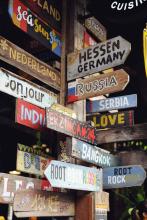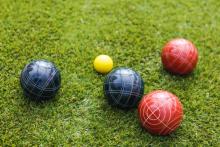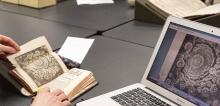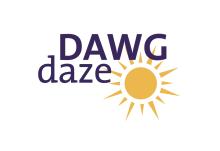The Department of French & Italian Studies will be participating in or hosting three events during Dawg Daze 2025. Check out the details for each event below! For any questions, please email frenital@uw.edu.
World Language Fair
September 18, 2025 | 12:00pm - 3:00pm | DEN 212 & 213

The Department of French & Italian Studies will be participating in this year's World Language Fair! Come visit to speak with faculty and staff and learn more about our programs (and pick up a snack). Representatives from the UW Italian Club and the UW French Language Association (FLA) will attending for those interested in joining our student clubs!
Did you know that UW is a leader in language education and offers classes for more than 45 languages? In addition to our many highly respected language programs, the UW campus is linguistically and culturally rich, with students, staff and faculty speaking many languages.
Come learn more about all of the benefits of studying a language, including career paths, scholarships, study abroad opportunities, and more!
The UW World Language Fair is a place for you to meet folks from our many language programs, clubs and centers. It will be a friendly, open space for you to explore and talk with folks. Drop by, learn more and say ‘hi’ (in a variety of languages)!
Bocce vs. Pétanque: French & Italian Lawn Games
September 19, 2025 | 11:00am - 1:00pm | Sylvan Grove

Come join the French and Italian Studies department for Bocce and Pétanque games in the lawn! Bocce and Pétanque are both similar Italian and French lawn games. Bocce, originating in the sixth century BC (and is also an Olympic sport!) is played with eight bocce (larger balls), and one pallino (smaller target ball). The object is simple: toss the balls closest to the pallino. Pétanque, on the other hand is a century-old game originating from Provence, in the South of France. It is similar to bocce in its rules and objectives!
There is no need to have any experience with these games – the rules are fairly simple and easy! We will rotate between about 8 to 16 attendees at a time for these lawn games – and will have some special prizes for winners.
Old Books, New Technologies: UW Special Collections and the Minor in Textual Studies and Digital Humanities
September 22, 2025 | 10:30am - 12:30pm | Special Collections (Allen Library B069)

Thinking about a career in libraries and archives, publishing and editing, or in a field dedicated to preserving and making accessible cultural materials and documents, both physical and digital? Interested in learning to work with historical artifacts like early printed books, medieval manuscripts, and archival and cultural documents, and with digital tools for creating online editions and archives for such materials? Curious to explore the role of databases and search algorithms in shaping how, today, we find, access, and understand texts and documents and to discover skills for analyzing those databases and building your own?
Learn about the minor in Textual Studies and Digital Humanities from faculty, students and librarians involved in the program. Hear about current student work, current and upcoming courses as well as about resources in the libraries and other sites on campus for studying the history and future of how we write, read, archive, story, access, and analyze cultural texts, historical documents, and other materials. Coursework and capstones in the minor offer a range of possibilities for hands-on, projected-oriented work exploring the impacts of changing technologies and media forms on the writing, reading, editing, archiving, preservation, and transmission of texts across history. These opportunities include working with historical materials such as handprinted books and manuscripts, archival sources and artists’ books; using digitization tools to create and publish digital editions and exhibits based on those materials; and developing skills to build, analyze and understand text-oriented databases like Google Books, applying data science techniques in the humanities.
